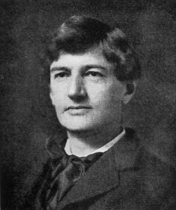“The greatest joy in nature is the absence of man.”
New York Times review of Mr. Carman's Prose; A Volume Of Little Essays By The Canadian Poet. (1903).
William Bliss Carman was a Canadian poet who lived most of his life in the United States, where he achieved international fame. He was acclaimed as Canada's poet laureate during his later years.In Canada, Carman is classed as one of the Confederation Poets, a group which also included Charles G.D. Roberts , Archibald Lampman, and Duncan Campbell Scott. "Of the group, Carman had the surest lyric touch and achieved the widest international recognition. But unlike others, he never attempted to secure his income by novel writing, popular journalism, or non-literary employment. He remained a poet, supplementing his art with critical commentaries on literary ideas, philosophy, and aesthetics." Wikipedia

“The greatest joy in nature is the absence of man.”
New York Times review of Mr. Carman's Prose; A Volume Of Little Essays By The Canadian Poet. (1903).
The full toast, as reported in New York Sun. Quoted in John Coldwell Adams, Confederation Voices http://www.uwo.ca/english/canadianpoetry/confederation/John%20Coldwell%20Adams/Confederation%20Voices/chapter%203.html, 2007.
A Toast, reported in Bartlett's Familiar Quotations, 10th ed. (1919).
“There paused to shut the door
A fellow called the Wind,
With mystery before,
And reticence behind.”
At the Granite Gate, reported in Bartlett's Familiar Quotations, 10th ed. (1919).
“The glad indomitable sea,
The strong white sun.”
A Sea Child, reported in Bartlett's Familiar Quotations, 10th ed. (1919).